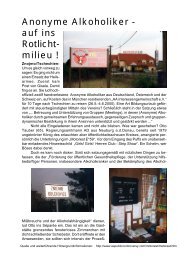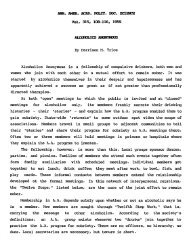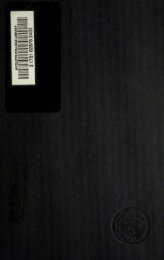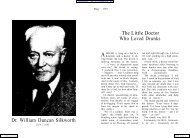yond! <strong>The</strong> Beyond is here! Its miracle is here, is everywhere! ... Where before everythingwas vagueness, uncertainty and perplexity, everything is now clarity, certainty,simplicity. Where there was drifting, now there is direction ... Where there was ...staleness and routine, there is now newness and magic.” [chapter 2, section V]Suddenly he could see the presence <strong>of</strong> God shining forth in some strange fashionin the trees and flowers, and hills and skies, and all the world around him. In mybook Images <strong>of</strong> Christ, I refer to this as “nature mysticism,” a way <strong>of</strong> feeling God’s numinousreality which was a recurrent motif in the Romantic tradition in literature. 11Philip Leon modifies a famous stanza from the English romantic poet Wordsworth’sOde on Intimations <strong>of</strong> Immortality to describe this spiritual experience.<strong>The</strong>re was a time when meadow, grove, and stream,<strong>The</strong> earth, and every common sight,To me did seemApparelled in celestial light<strong>The</strong> glory and the freshness <strong>of</strong> a dream.In 1917, the German theologian Rudolf Otto gave a detailed philosophicalaccount <strong>of</strong> how we can apprehend God in this way, in a book which is still one <strong>of</strong>the truly great theological classics, <strong>The</strong> Idea <strong>of</strong> the Holy. Otto was a Kantian, just likeLeon, but used a different strategy for describing the human mind’s contact withGod and the realm <strong>of</strong> the sacred: after toying (in an earlier book) with the theorythat we became aware <strong>of</strong> God’s presence at the level <strong>of</strong> the Absolute and the Unlimited,Otto argued in <strong>The</strong> Idea <strong>of</strong> the Holy that the numinous sense <strong>of</strong> the holy orsacred was instead one <strong>of</strong> the basic categories <strong>of</strong> the human understanding. 12Coming to see the Truth in all religions, as wellas the falling short <strong>of</strong> all religious systemsIn this kind <strong>of</strong> spiritual experience, Philip Leon said, he came to see the Light<strong>of</strong> Truth shining forth in all the religions and philosophies <strong>of</strong> the world. He gaineda new understanding <strong>of</strong> the doctrines taught by Judaism, Islam, ancient Greco-Roman paganism, and all the many varieties <strong>of</strong> Christianity. He was also able forthe first time to recognize the truly pr<strong>of</strong>ound discoveries made by philosophers likePlato, Aristotle, Kant, and Hegel. But he did not mean by this that everything all <strong>of</strong>those systems said was true, or that any <strong>of</strong> those religions and philosophies had thewhole truth. He was able to see where each <strong>of</strong> these religions and philosophies hadvalid things to say, but also where each <strong>of</strong> them fell short <strong>of</strong> the full truth, or evendenied an important measure <strong>of</strong> the truth.20
NOTES ON CHAPTER 3. SHARING OR SPREADINGTHE WORLD REVOLUTIONI must become a revolutionary,and a missionary to the diseased humansociety which forms the “larger self ”Just as the individual self is formed by its diseased fears and desires, so the thousands<strong>of</strong> fearful selves which at present make up the bulk <strong>of</strong> human society combinetogether to make a world dominated by hatred, envy, rigidity, authoritarian rules,and the fear <strong>of</strong> any kind <strong>of</strong> novelty, change, or revolutionary new approach toproblems. This is Nietzsche’s herd mentality, where the cowardly masses attempt todestroy the Übermensch (transcendent humanity). A social system which is institutionalizedselfishness and fear will necessarily oppose any courageous individuals whotry to be genuinely creative and think for themselves. [chapter 3, section I]And contrariwise, to keep my life healed, my only recourse will be to put myfull time efforts into changing the society in which I live, by working to changeother human lives and bring them out <strong>of</strong> sickness into health. <strong>The</strong>re is no staticdefense which will ultimately work; the only effective defense is to throw myself intotaking on the rigidity, hatred, fearfulness, authority systems, and selfishness whichdominate the world around me. I must be a missionary, and I must be a revolutionary.[chapter 3, section I]<strong>The</strong> coming <strong>of</strong> World War II, and the Communist,Fascist, Nazi, and labor union movementsLet us remember that Philip Leon finished writing this book in December 1938.In his introduction, he made the ominous statement: “<strong>The</strong> world is going mad, weare all saying ... A tide <strong>of</strong> homicidal mania is rolling towards us.”And indeed, the world did seem to be going mad. <strong>The</strong> Fascist leader Mussolinibecame Prime Minister <strong>of</strong> Italy in 1922 and soon began calling himself Il Duce.<strong>The</strong> Spanish Civil War, which began in 1936, ended up putting the Fascist GeneralFranco in total control <strong>of</strong> Spain on April 1, 1939. Adolf Hitler became Chancellor<strong>of</strong> Germany in 1933 and invaded Poland on September 1, 1939, which startedthe Second World War after Britain and France responded by declaring war on theGermans. On the other side <strong>of</strong> the globe, Japan occupied Manchuria in 1931, andbegan invading other parts <strong>of</strong> China in 1937. <strong>The</strong> United States responded withan oil embargo on Japan and other measures, which ultimately led on December 7,1941, to the Japanese attack on the United States naval base at Pearl Harbor whichthrust America into the war also.<strong>The</strong> Russian Revolution <strong>of</strong> 1917 ended up with the Bolsheviks taking overthat country and then imposing a dictatorial Communist system. In America, the21
- Page 1 and 2: The Philosophyof Courageor The Oxfo
- Page 3 and 4: fear of being creative and being ou
- Page 5 and 6: truly were. There was also a spirit
- Page 7 and 8: Comparison with Bill W. and A.A.on
- Page 9 and 10: I must embrace my own feeling of so
- Page 11 and 12: Alcoholism and addiction asforms of
- Page 13 and 14: specifications as to how that is to
- Page 15 and 16: perfect serenity. By shutting off a
- Page 17 and 18: The act of total surrender allows t
- Page 19: this. But you do not have to be any
- Page 23 and 24: [chapter 3, section II]If I am succ
- Page 25 and 26: NOTES ON CHAPTER 4. CHANGING SOCIET
- Page 27 and 28: The Oxford Group and Alcoholics Ano
- Page 29 and 30: view Press, 2000) 28. “Sick origi
- Page 31 and 32: INTRODUCTIONThe world is going mad,
- Page 33 and 34: TRUE RELIGIONWhy are you cowards, p
- Page 35 and 36: CONTENTSIntroductionTrue Religion31
- Page 37 and 38: to do the same for the term “pixi
- Page 39 and 40: the power which is God or from God.
- Page 41 and 42: God. The reader who is asked to con
- Page 43 and 44: these qualities and on the relation
- Page 45 and 46: y the power of God. But it is not n
- Page 47 and 48: IIMYSELFI AM NOT GODThe objection l
- Page 49 and 50: DISEASE OR FEAR: MANIAWhat is wrong
- Page 51 and 52: impurity which is denoted by the si
- Page 53 and 54: occasions when he is threatened wit
- Page 55 and 56: IIIHEALTH OR PASSIONPURE DESIRESinc
- Page 57 and 58: PASSION AND PARTICULAR DESIRESNot b
- Page 59 and 60: Chapter 2DEMONSTRATION BY EXPERIMEN
- Page 61 and 62: to desire passionately to be health
- Page 63 and 64: Conformity with the commandment aga
- Page 65 and 66: IITHE CRUCIAL EXPERIMENT ORTHE QUIE
- Page 67 and 68: and hypocrisy, that judged by absol
- Page 69 and 70: not meant; that the fool was not as
- Page 71 and 72:
hands I commit my spirit.”With th
- Page 73 and 74:
that God the Highwayman is really a
- Page 75 and 76:
I obey guidance to go and see a man
- Page 77 and 78:
foreseen or seen as I have represen
- Page 79 and 80:
AN ILLUSTRATIONBecause the checking
- Page 81 and 82:
IVTHE QUITE TIME AND THEH WORKING D
- Page 83 and 84:
NEED FOR AN ADEQUATE PSYCHOLOGY OF
- Page 85 and 86:
only to poets. But to judge from on
- Page 87 and 88:
For the first time passion or the r
- Page 89 and 90:
HEAVENWhat I have come to is Heaven
- Page 91 and 92:
For Heaven is now no longer a dream
- Page 93 and 94:
I am contiguous with other selves i
- Page 95 and 96:
expanses of self, seem to be experi
- Page 97 and 98:
IITHE STRATEGY OF THE LARGER SELFGO
- Page 99 and 100:
FEAR CONCEALS FEARNow the procedure
- Page 101 and 102:
exposure of the “universe.” Tru
- Page 103 and 104:
IIITHE STRATEGY AGAINST THE LARGER
- Page 105 and 106:
his own. The miracle of self-consci
- Page 107 and 108:
usiness, for government, for the na
- Page 109 and 110:
and then make him follow its course
- Page 111 and 112:
importance to the Company. However,
- Page 113 and 114:
of smugness, self-satisfaction and
- Page 115 and 116:
PREOCCUPATION WITH SYMPTOMSWhen “
- Page 117 and 118:
channel through which collective gu
- Page 119 and 120:
abyss and the area coincide. It is
- Page 121 and 122:
IVTHE ECONOMIC PROBLEMTHE ECONOMIC
- Page 123 and 124:
that need or greed, and not the cap
- Page 125 and 126:
VPOLITICAL SCIENCEUNCHANGED POLITIC
- Page 127 and 128:
it, by blaming other people instead
- Page 129 and 130:
VIPHILOSOPHY AND ARTTHE SINS OF THE
- Page 131 and 132:
For expression or projection is the
- Page 133 and 134:
DENYING THE SEPARATION BETWEEN THE
- Page 135 and 136:
which the errors are designed to pr
- Page 137 and 138:
A PERSONAL NOTEThe philosophy given
- Page 139 and 140:
the formation of sacred stereotypes















